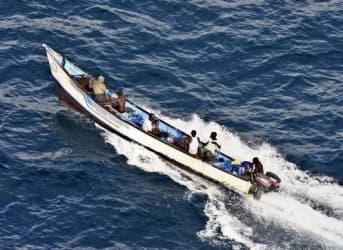First, the good news.
Piracy off Somalia is down. In 2012, there were 297 piracy attacks and 28 hijackings worldwide, according to the International Maritime Bureau’s Piracy Reporting Center, with 75 incidents attributed to Somali pirates, who captured 250 hostages.
Royal Dutch Navy Commodore Ben Bekkering, the former commander of the NATO counter piracy task force, said, “The numbers of successful pirate attacks are going down, but I am also pretty sure that as soon as we turn away and go somewhere else, they will be back in big numbers.”
In the past few years, NATO and the U.S. have led multinational anti-piracy security campaigns off East Africa, whose ad hoc flotillas have included member vessels from nations as diverse as Iran and China. Seeking a more robust response, some shipping companies have armed vessels with private guards and barbed wire, while an international campaign to make it easier to prosecute pirates also has contributed to the piracy decline.
Related article: Investors Beware: Egypt's Revolution is Not Over
Although the number of pirate attacks off the Somali coast has markedly declined, the conditions that make piracy a lucrative pursuit in African waters, which include poverty, political instability and lawlessness, remain.
And like toothpaste squeezed out of a tube, Bekkering’s predictions seem to be coming true, only this time, off West Africa.
According to port authority officials in Abidjan, the French tanker Gascogne has been hijacked off Côte d'Ivoire. Alexis Guie, in charge of Abidjan’s port communications said, "The boat was hijacked in international waters."
According to the French government, the Gascogne, owned by the French group Sea-Tankers, a shipping firm based in Merignac, France, was sailing under a Luxembourgian flag and had a crew of 19 Togolese sailors.
What is most interesting about Guie’s comments was the remark about “international waters.”
According to the Third United Nations Convention on the Law of the Sea (UNCLOS), which came into force in November 1994, a nation with a maritime frontier can claim an Exclusive Economic Zone (EEZ) of 200 nautical miles from its coastline.
"When a boat is hijacked more than 300 kilometers from the Ivorian coast, that can't be in our waters," Guie said, adding that Ivorian authorities had "no information" about the incident.
Since 2011 piracy in the Gulf of Guinea has increased from mere “snatch and grab” armed robberies to hijackings and cargo thefts. Addressing the rising chaos, in 2012 London-based Lloyd's Market Association insurers listed Nigeria, Benin and surrounding waters in the same risk category as Somalia, where the collapse of a central government in 1991 and the resultant anarchy allowed piracy to establish a foothold. Ironically, as piracy off the Horn of Africa in the Arabian Sea and Indian Ocean diminished off Somalia's coast due to robust international naval efforts, it subsequently increased in the Gulf of Guinea. The Gulf of Guinea, which includes Nigerian coastal waters, Africa's largest oil producer, is rapidly emerging as the world’s new piracy hotspot, with 62 attacks in 2012.
The piratical assaults as far west as Ivory Coast are a new development for West African waters however, with two similar hijackings off Abidjan since October 2012.
Increasing anxieties among the seafaring community, West Africa pirates have been more willing to use violence, as they target the cargo, not the crew for ransom, as was the case off Somalia, where a well-established network of fiscal intermediaries made piratical hijacking of merchantmen a lucrative business.
ADVERTISEMENT
Related article: Mali, Nigeria, and the Bigger Picture
In their most impressive tanker escapade, on 14 November 2008 Somali pirates hijacked the Saudi owned 1,080-foot Sirius Star tanker, which was freed in January 2009 after a $3 million ransom had been paid.
So, the latest news from the Gulf of Guinea? Noel Choong, of the International Maritime Bureau observed, "It appears pirates are moving towards the Ivory Coast because Nigeria and Benin have increased patrols in the Gulf of Guinea."
So, who’s going to pick up the slack on this? As the Pentagon’s AFRICOM moves into Africa, don’t be surprised if it eventually includes a naval component. After all, this year African oil production is projected to grow to 10.7-11.4 million barrels per day and by 2018 to 12.4-14.5 million bpd. The U.S. is currently Nigeria's biggest oil importer, and the National Intelligence Council further projects that U.S. oil imports from the Gulf of Guinea will increase to more than 25 percent of all U.S. imports by 2015, a mere two years away.
By. John C.K. Daly of Oilprice.com


















